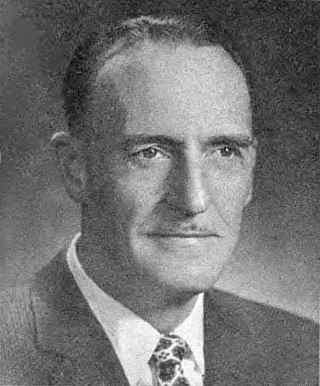Top Qs
Timeline
Chat
Perspective
Ralph Rivers
American politician (1903–1976) From Wikipedia, the free encyclopedia
Remove ads
Ralph Julian Rivers (May 23, 1903 – August 13, 1976) was an American lawyer and Democratic politician who served as the first United States representative from Alaska, serving from statehood in 1959 to his resignation in 1966 following his defeat by Republican Howard W. Pollock.[2] He previously served as the shadow U.S. Representative from Alaska Territory from 1956 to 1959.
This article has multiple issues. Please help improve it or discuss these issues on the talk page. (Learn how and when to remove these messages)
|
Remove ads
Biography
Summarize
Perspective
Born in Seattle, Washington to Louisa Zenaide (née Lavoy) and Julian Guy Rivers,[3] Rivers attended grammar school in Flat, Alaska, and Franklin High School in Seattle. He worked as a gold miner in Flat from 1921 to 1923, and then earned an LL.B. from the University of Washington School of Law in 1929. He then worked as a lawyer in private practice for several years.

Rivers was a lifelong civil servant, working in a number of public positions throughout his life. He served as United States Attorney for District of Alaska, from 1933 to 1944.[4] He was then elected as the attorney general of Alaska, serving from 1945 to 1949.[5] He was the chair of the Employment Security Commission of Alaska from 1950 to 1952, and then became the mayor of Fairbanks, Alaska from 1952 to 1954. In 1954 he was also president of the League of Alaskan Cities. He was a member of the Alaska Territorial Senate in 1955, and was the second vice president of the Alaska Constitutional Convention at College, Alaska in 1955 and 1956. He was a delegate to the Democratic National Conventions in 1960, 1964, and 1968.
Rivers appeared on the game show To Tell the Truth as contestant #1 in the second group of contestants on June 2, 1959.[6] Rivers died at his home in Chehalis, Washington on the morning of August 13, 1976.[7]
Remove ads
U.S. House of Representatives
In 1957 and 1958, Rivers was a United States representative-elect under the Alaska-Tennessee Plan in Washington, D.C., on a provisional basis, pending statehood. Upon the admission of Alaska as a State into the Union, he was elected as a Democrat to the Eighty-sixth and to the three succeeding Congresses and served from January 3, 1959 until December 30, 1966.[8] He was an unsuccessful candidate for reelection to the Ninetieth Congress in 1966, resigning days before the end of his term.
While in Congress, he voted in favor of the Civil Rights Act of 1960[9] and the Civil Rights Act of 1964.[10] He voted as well for the 24th Amendment to the U.S. Constitution and the Voting Rights Act of 1965.[11][12]
Remove ads
Electoral history
Summarize
Perspective
Alaska's at-large congressional district: Results 1958–1966[13]
Remove ads
References
External links
Wikiwand - on
Seamless Wikipedia browsing. On steroids.
Remove ads

